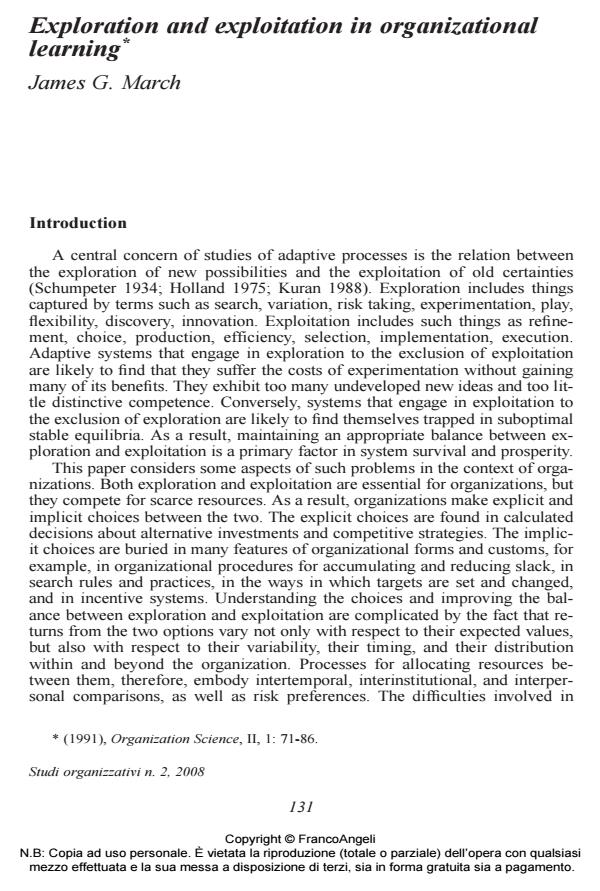Exploration and exploitation in organizational learning
Titolo Rivista STUDI ORGANIZZATIVI
Autori/Curatori James G. March
Anno di pubblicazione 2009 Fascicolo 2008/2
Lingua Italiano Numero pagine 0 P. Dimensione file 483 KB
DOI 10.3280/SO2008-002006
Il DOI è il codice a barre della proprietà intellettuale: per saperne di più
clicca qui
Qui sotto puoi vedere in anteprima la prima pagina di questo articolo.
Se questo articolo ti interessa, lo puoi acquistare (e scaricare in formato pdf) seguendo le facili indicazioni per acquistare il download credit. Acquista Download Credits per scaricare questo Articolo in formato PDF

FrancoAngeli è membro della Publishers International Linking Association, Inc (PILA), associazione indipendente e non profit per facilitare (attraverso i servizi tecnologici implementati da CrossRef.org) l’accesso degli studiosi ai contenuti digitali nelle pubblicazioni professionali e scientifiche.
Exploration and explotation in organizational learning - This paper considers the relation between the exploration of new possibilities and the exploitation of old certainties in organizational learning. It examines some complications in allocating resources between the two, particularly those introduced by the distribution of costs and benefits across time and space, and the effects of ecological interaction. Two general situations involving the development and use of knowledge in organizations are modeled. The first is the case of mutual learning between members of an organization and an organizational code. The .second is the case of learning and competitive advantage in competition for primacy. The paper develops an argument that adaptive processes, by refining exploitation more rapidly than exploration, are likely to become effective in the short run but self-destructive in the long run. The possibility that certain common organizational practices ameliorate that tendency is assessed.
- The role of universities in regional knowledge base renewal Nils Grashof, Holger Graf, in Regional Studies 2521052/2025
DOI: 10.1080/00343404.2025.2521052 - L’effet des variables de contingence configurationnelle personnelle sur le succès des projets entrepreneuriaux basés sur l’intelligence artificielle en Tunisie Lobna Affes, in Communication, technologies et développement /2022
DOI: 10.4000/ctd.6308 - Balance or not: configuring absorbed and unabsorbed slack resources to achieve supply chain resilience Chunping Deng, Fanchen Kong, Rong Zhu, Chun Sun, in Operations Management Research /2024 pp.1509
DOI: 10.1007/s12063-024-00521-0 - Designing for Policy Success Mallory E. Compton, Joannah Luetjens, Paul ‘t Hart, in International Review of Public Policy /2019 pp.119
DOI: 10.4000/irpp.514 - Cultural hybridization of human resource practices in China: lessons learned from an intervention-research in a chinese company Ziyuan Tang, Marc Bonnet, in Revue de gestion des ressources humaines /2024 pp.40
DOI: 10.54695/grhu.134.0040 - Les nouvelles stratégies d’innovation des firmes françaises de plasturgie Dorian Debrand, in Revue d'économie industrielle /2018 pp.9
DOI: 10.4000/rei.7561 - Éduquer à la GRH dans les organisations publiques : un processus tiré par la demande ou par les connaissances ? Véronique Chanut, Hervé Chavas, in Politiques et Management Public /2011 pp.169
DOI: 10.4000/pmp.1351 - Electronic Government Johan Magnusson, Andrea Gajic, Leman Isik, Christina Nilsson, pp.446 (ISBN:978-3-031-41137-3)
- Firm specialization in clean energy technologies: The influence of path dependence and technological diversification Patricia Laurens, Christian Le Bas, Stéphane Lhuillery, in Revue d'économie industrielle /2018 pp.73
DOI: 10.4000/rei.7625 - Conduire le changement en bibliothèque pp.175 (ISBN:979-10-91281-17-1)
- Stratégie d’entreprise Thierry Weil, pp.215 (ISBN:9782356710062)
- Antecedents of business resilience in hospitality industry: the role of organizational learning and innovation capability Rudi Salam, Kusdi Raharjo, Zainul Arifin, Mohammad Iqbal, in Cogent Social Sciences 2603573/2026
DOI: 10.1080/23311886.2025.2603573 - What are the strategies for having success in an uncertain market in the new business creation? Marisangela Bastos Lima Csik, Paulo Roberto Feldmann, Mario Sergio Salerno, in Journal of International Entrepreneurship /2025
DOI: 10.1007/s10843-025-00391-y - Les impacts humains des changements organisationnels autour des TIC Robert Picard, in Perspectives interdisciplinaires sur le travail et la santé /2007
DOI: 10.4000/pistes.2962
James G. March, Exploration and exploitation in organizational learning in "STUDI ORGANIZZATIVI " 2/2008, pp , DOI: 10.3280/SO2008-002006